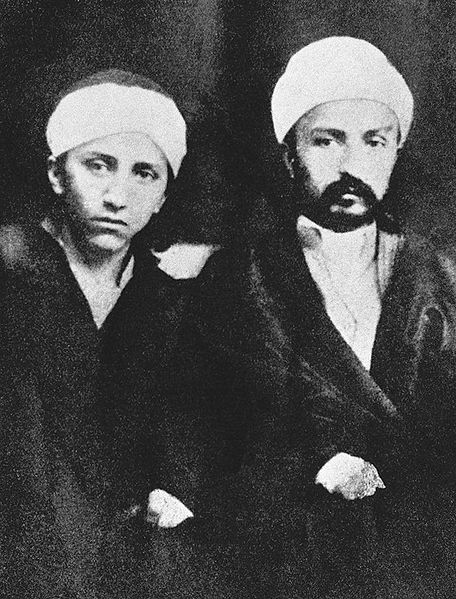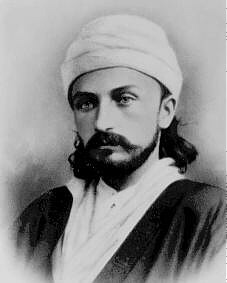The Titanic’s Forgotten “Survivor”
Article by Rainn Wilson, of “The Office” in HuffingtonPost
As we’ve been reminded innumerable times over the past few weeks, one hundred years ago the “unsinkable” Titanic sank into the North Atlantic, taking with her more than 1,500 lives. The tragedy has made for some epic storytelling.
Of all the stories, one of the most extraordinary is that of a 68-year-old Persian who wasn’t, it turns out, actually on the ill-fated vessel, but was supposed to be.
Abbas Effendi — known as Abdu’l-Baha or “the Servant of God” — was feted by the press in both Europe and the U.S. as a philosopher, a peace apostle, even the return of Christ. His American admirers had sent him thousands of dollars for a ticket on the Titanic, and begged him to ride in the greatest of opulence. He declined and gave the money to charity.
“I was asked to sail upon the Titanic,” he later said, “but my heart did not prompt me to do so.”
Instead, Abdu’l-Baha sailed to New York on the more modest SS Cedric. Every major newspaper in New York covered his arrival on April 11 and his eight-month coast-to-coast tour that followed. This turbaned foreigner in “oriental robes” was front-page news.
The New York Times reported that his mission was “to do away with prejudices… prejudice of nationality, of race, of religion.” The article also quotes him directly: “The time has come for humanity to hoist the standard of the oneness of the human world, so that dogmatic formulas and superstitions may end.”
The press often called him a prophet, especially a “Persian Prophet” (ah, alliteration!). One headline, following his talk at Stanford University, read: “Prophet Says He Is Not A Prophet.” Abdu’l-Baha was in fact the leader of the then nascent Baha’i Faith, though he consistently denied the whole prophet thing.
He preached the faith founded by his father, Baha’u’llah, in the mid-1800s, rooted in the unity of all religions. At the time there were only a few hundred Bahai’s in the U.S.; today there are 150,000. Day after day, month after month, crowds across America (often in the thousands) flocked to hear him talk. In synagogues he praised Christ. In churches he extolled the teachings of Mohammed. And throughout his travels his company was sought by luminaries like Andrew Carnegie, Alexander Graham Bell and Kahlil Gibran.

Just how did Abdu’l-Baha come to inspire so many — this obscure figure from the east who had spent 40-something years imprisoned for his religion, who had never attended school or been exposed to western culture?
I suspect it has something do with not just what he said, but what he did. “He is the only man in the world who at his dinner table has gathered Persian, Zorastan, Jew, Christian, Mahometan,” [sic]wrote the New York Tribune‘s Kate Carew (the Liz Smith of her era). Later in the piece, sans her trademark levity, she describes Abdu’l-Baha’s visit to the Bowery Mission on the Lower East Side — where he personally handed out silver coins to 400 homeless men.
Throughout his U.S. visit he swept aside the social protocol of segregation by insisting that everywhere he spoke be open to people of all races. Not the biggest crowd pleaser at the time. At the Great Northern Hotel on 57th Street (now the Parker Meridien), the manager vehemently refused to allow any blacks on the property.
“If the people see that one colored person has entered my hotel, no respectable person will ever set foot in it,” he said. So Abdu’l-Baha instead organized a multi-racial feast at the home of one of his followers, with many whites serving blacks — a subversive, even dangerous notion at the time.
 Only among humans was skin color a cause of discord, Abdu’l-Baha once remarked. “Animals, despite the fact that they lack reason and understanding, do not make colors the cause of conflict. Why should man, who has reason, create conflict?”
Only among humans was skin color a cause of discord, Abdu’l-Baha once remarked. “Animals, despite the fact that they lack reason and understanding, do not make colors the cause of conflict. Why should man, who has reason, create conflict?”
Abdu’l-Baha’s talks pierced audiences with a radical simplicity. And yet he advanced ideas that Americans still wrestle with a century later: the need for true racial harmony and gender equality; the elimination of extreme wealth and poverty; the dangers of nationalism and religious bigotry; and an insistence upon the independent search for truth. Any of those ring a bell in 2012?
His mission of unity, spread throughout our nation one hundred years ago, should be celebrated alongside the messages of Gandhi, the Dalai Lama and Martin Luther King Jr.
In his very first public address in the U.S. — at New York’s Church of Ascension on Fifth Avenue and 10th Street — Abdu’l-Baha hailed America’s material progress in the arts, agriculture and commerce, but with a caution to also develop our spiritual potentialities.
“For man two wings are necessary. One wing is physical power and material civilization; the other is spiritual power and divine civilization. With one wing only, flight is impossible.”
He gave the talk on April 14, 1912. Later that same day the Titanic struck the iceberg.
http://www.huffingtonpost.com/rainn-wilson/abdul-baha_b_1419099.html
